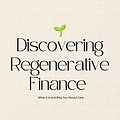Discovering Regenerative Finance🌱: What It Is and Why You Should Care
A New Frontier for Sustainable Economic Growth
Regenerative Finance, commonly referred to as "ReFi," is an emerging financial model that seeks to utilize the power of blockchain and Web3 technologies to blend inclusivity, transparency, and accessibility, creating an alternative to traditional financial systems. It is a movement focusing on creating a more equitable and sustainable financial system.
In this article, we will delve into the world of ReFi and why you should care about it.
Redefining our relationship with Money:
Regenerative Finance aims to redefine how we perceive and interact with money, shifting our focus from short-term gains to long-term sustainability and shared prosperity. By prioritizing social and environmental impact, ReFi encourages investments in projects that generate positive outcomes for people and the planet.
Key Elements of Regenerative Finance:
Decentralization: ReFi leverages the decentralized nature of blockchain technology, eliminating the need for intermediaries and enabling direct peer-to-peer transactions. This reduces transaction costs and fosters financial inclusion by making financial services accessible to those underserved by traditional financial systems.
Sustainability: ReFi initiatives emphasize environmental conservation and regeneration, supporting projects that combat climate change and promote the responsible use of natural resources.
Social Impact: Regenerative Finance projects prioritize social equity, addressing issues such as income inequality and providing opportunities for underserved communities to thrive.
Transparency and Accountability: Blockchain technology ensures that all transactions are recorded on a public, tamper-proof ledger, allowing for increased transparency and trust in ReFi initiatives.
Community Empowerment: ReFi projects often involve community-driven decision-making processes, empowering local communities to have a say in the projects and initiatives that affect them directly.
Why You Should Care About Regenerative Finance:
Climate Action: ReFi projects like KlimaDAO and Celo Climate Collective are taking tangible steps to mitigate the effects of climate change by incentivizing carbon reduction and sustainable resource management.
Financial Inclusion: Regenerative Finance provides access to financial services for people in remote areas or those who are underserved by traditional banking systems, fostering greater economic participation and empowerment.
A Sustainable Future: ReFi programs support the Sustainable Development Goals (SDGs) of the United Nations by supporting sustainable economic growth, promoting responsible consumption and production, and minimizing inequality.
Ethical Investments: ReFi offers a platform for individuals and institutions to invest in projects with positive social and environmental impact, aligning financial decisions with ethical values.
Resilience and Adaptability: ReFi projects are designed to adapt to changing circumstances, such as economic fluctuations or environmental disasters, promoting greater resilience in the face of global challenges.
Regenerative Finance in Practice: There are already several ReFi projects making a difference on the ground. For instance, Grassroots Economics, a nonprofit, has created community currencies in Kenya. These currencies assist local communities in developing and managing their own digital tokens to boost local economic activity and combat poverty. Regen Network is another illustration, which uses blockchain to build a market for ecological assets and rewards landowners for using regenerative land management techniques.
In conclusion, Regenerative Finance (ReFi) offers a novel method for achieving sustainability and economic growth through the application of blockchain and Web3 technology. It is important to keep up with this new trend, look at ReFi projects that are already underway, and think about how such financial models can affect the state of the world economy. We can better grasp how ReFi may help address some of the most important issues of our day and promote a more egalitarian, sustainable, and resilient society by knowing more about it and its consequences.
References:
Related Stories:






very interesting read
i learnt a few more things again
😆🕊️🕊️